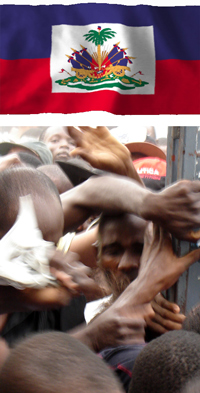By Saeed Shabazz -Staff Writer-

UNITED NATIONS (FinalCall.com)- A spokesperson for the UN High Commissioner for Refugees announced on July 13 that “continuing difficulties in Haiti following the 2010 earthquake are leading thousands of Haitians to flee their homeland, often in unseaworthy vessels.”
UNHCR reports that a Haitian woman drowned on July 10, when a boat carrying her fellow countrymen ran aground near the Bahamas. The Shipping News June 26 reported 79 Haitian migrants were rescued after their boat became stranded near the shores of Puerto Rico. The migrants were reportedly placed in the custody of the Caribbean Border Interagency group for processing.
On June 12, a dozen Haitians lost their lives in Bahamian/U.S. waters trying to reach Florida, according to UNHCR. The agency noted 652 Haitians have been found on boats during rescue or interception operations since December 2011.
“Obviously there are Haitians who feel that their beloved island isn’t the best place to be at this time,” Jean-Robert Lafortune, an activist with the Florida-based Haitian American Justice Coalition told The Final Call. Haitians taking to boats to escape is “something that is very serious,” he added. He stressed serious economic problems and harrowing conditions are driving Haitians to sea.
The Associated Press July 23 reported 300,000 Haitians are still homeless two years after a devastating earthquake; the U.S. has failed to keep promises to rebuild or replace thousands of destroyed homes; half of the $1.8 billion promised for the rebuilding still sits in the U.S. Treasury accounts. The AP said it took a Freedom of Information Request to get the information.
Amadi Ajamu, spokesperson for the Brooklyn-based Friday Haiti Relief Coalition, told The Final Call onlookers at weekly demonstrations in front of the International Red Cross office and United Nations–where protestors demand to know what happened to money promised to the Black republic–were surprised to learn money they thought was going to Haiti was not getting to the people.
Ms. Ajamu said the main reason Haitians are taking to rickety boats is poverty. Projects81Haiti.org reports 80 percent of Haitians live on less than $2-a-day; Haiti is the third hungriest nation in the world; 70 percent of Haitians do not have electricity; 90 percent have no running water; 80 percent lack adequate sanitation.
Haitian activists like Ezili Danto of the Conn.-based Haitian Lawyers Legal Network argue Haiti’s poverty is fueled in part by poverty wages paid to workers. In an article titled “The Slow and Silent Genocide the U.S. Is Conducting In Haiti” Ms. Danto writes: “Since the 1970s Haiti assembly plant workers, mostly women, have battled to raise the minimum wage to a living wage, and for humane working conditions.”
Ms. Danto wrote that the Haitian Parliament voted in 2009 to raise the minimum wage for assembly plant workers from $3-a-day to $5-a-day. “The UN Special Envoy to Haiti, former U.S. president Bill Clinton, and U.S. Secretary of State Hillary Clinton forced Haiti officials to rescind the vote,” Ms. Danto said.
The Final Call contacted the Haitian Embassy in Washington, D.C., the UN Mission in New York City and the U.S. State Department asking for comments, but at press time no responses had come in.
A spokesperson for UNHCR said her agency has concerns about nations returning people to Haiti, ignoring an earlier appeal by the UN not to return Haitians without adequate individual protection or screening. That concern was among questions The Final Call sought to ask the State Department.
In 1991-1992, 40,000 Haitians escaped by boat and many died at sea. President George H.W. Bush ordered the Coast Guard to return all of the so-called boat people regardless of their status. Former President Clinton continued the senior Bush’s policy, according to the Constitutional Rights Foundation.
But some believe the mishandling of the Haitian crisis is not just a shame but also a crime. “We will continue our campaign to have the nations of France and the U.S. indicted for crimes against humanity by the International Criminal Court because of their destabilizing policies against the Haitian people,” said Ms. Ajamu.












